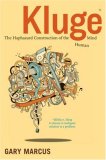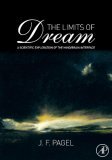I’m not sure how I missed posting about Kluge: The Haphazard Construction of the Human Mind by Gary Marcus before this, but there’s probably a good explanation in the book!

Product description:
Are we noble in reason? Perfect, in God’s image? Far from it, says New York University psychologist Gary Marcus. In this lucid and revealing book, Marcus argues that the mind is not an elegantly designed organ but rather a “kluge,” a clumsy, cobbled-together contraption. He unveils a fundamentally new way of looking at the human mind — think duct tape, not supercomputer — that sheds light on some of the most mysterious aspects of human nature.
Taking us on a tour of the fundamental areas of human experience — memory, belief, decision-making, language, and happiness — Marcus reveals the myriad ways our minds fall short. He examines why people often vote against their own interests, why money can’t buy happiness, why leaders often stick to bad decisions, and why a sentence like “people people left left” ties us in knots even though it’s only four words long.
Marcus also offers surprisingly effective ways to outwit our inner kluge, for the betterment of ourselves and society. Throughout, he shows how only evolution — haphazard and undirected — could have produced the minds we humans have, while making a brilliant case for the power and usefulness of imperfection.
Marcus was on bloggingheads.tv with Carl Zimmer last week.
Comments (0)
- mind,new books
April 16, 2008
While I was working on my taxes the last few days, there was a big “Seeds of Compassion” Conference in Seattle (April 11-15, 2008) which fortunately has a great webcast of the event, that I’ve just been watching. The Dalai Lama was there, and the opening session is a discussion of “The Scientific Basis for Compassion,” similar to the Mind and Life Institute events. The focus appears to be on compassion in child development.
There is an associated wiki with a reading list and some interesting mind-map style sketches from the conference.

Some of the participants also contributed to the 2001 book Visions of Compassion: Western Scientists and Tibetan Buddhists Examine Human Nature, one of the Mind and Life Institute books.
I also saw that the Dalai Lama is at the Mayo Clinic in Rochester, Minnesota, today (April 16) for Mind and Life XVI, Investigating the Mind-Body Connection: The Science and Clinical Applications of Meditation, which is also supposed to have a webcast, but I wasn’t able to connect to that one today.
Comments (0)
- cognitive science,meditation,mind
March 25, 2008

The Limits of Dream: A Scientific Exploration of the Mind/Brain Interface by J.F. Pagel (Academic Press, 2008).
From the book description:
The Limits of Dream focuses on what we currently know of the human central nervous system (CNS), examining the basic sciences of neurochemisty, neuroanatomy, and CNS electrophysiology as these sciences apply to dream, then reaching beyond basic science to examine the cognitive science of dreaming including the processes of memory, the perceptual interface, and visual imagery. Building on what is known of intrapersonal CNS processing, the book steps outside the physical body to explore artificially created dreams and their use in filmmaking, art and story, as well as the role of dreaming in creative process and creative madness. The limits of our scientific knowledge of dream frame this window that can be used to explore the border between body and mind. What is known scientifically of the cognitive process of dreaming will lead the neuroscientist, the student of cognitive science, and the general reader down different paths than expected into an exploration of the fuzzy and complex horizon between mind and brain.
Comments (0)
- cognitive science,mind,new books
 The current issue of New Scientist has a feature on “life-changing books” by 17 prominent scientists, with the magazine writers and editors chiming in through short videos and some readers’ suggestions as well.
The current issue of New Scientist has a feature on “life-changing books” by 17 prominent scientists, with the magazine writers and editors chiming in through short videos and some readers’ suggestions as well.




